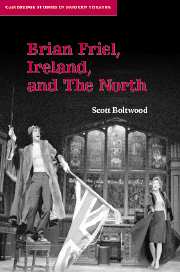Book contents
- Frontmatter
- Contents
- Acknowledgments
- List of abbreviations
- Introduction: Friel, criticism, and theory
- 1 The Irish Press essays, 1962–1963: Alien and native
- 2 The plays of the 1960s: Assessing partition’s aftermath
- 3 The plays of the 1970s: Interrogating nationalism
- 4 Plays 1980–1993: The North
- 5 Plays 1994–2005: Retreat from Ireland and The Home Place
- Notes
- Works cited
- Index
5 - Plays 1994–2005: Retreat from Ireland and The Home Place
Published online by Cambridge University Press: 22 September 2009
- Frontmatter
- Contents
- Acknowledgments
- List of abbreviations
- Introduction: Friel, criticism, and theory
- 1 The Irish Press essays, 1962–1963: Alien and native
- 2 The plays of the 1960s: Assessing partition’s aftermath
- 3 The plays of the 1970s: Interrogating nationalism
- 4 Plays 1980–1993: The North
- 5 Plays 1994–2005: Retreat from Ireland and The Home Place
- Notes
- Works cited
- Index
Summary
Molly Sweeney and Give Me Your Answer, Do!
Although Molly Sweeney enjoyed considerable popular and critical success when it premiered in Dublin in 1994 and transferred to New York in 1996, even winning the New York Drama Critics Circle award for Best Foreign Play of 1996, it has attracted surprisingly little scholarship; in fact, the more recent Give Me Your Answer, Do! (1997) has inspired more articles, despite its failure to satisfy either audiences or critics. The earlier play's structural similarity to the acclaimed Faith Healer – both are composed of monologues delivered by two men and a woman – may account for this critical reluctance on the part of those who suspect that in this play the elder Friel is repeating himself in diminished form. These monologues reconstruct the story of Molly, a blind massage therapist in Ballybeg, who marries Frank Sweeney after years of contentedly living alone and pursuing her modest interests. Frank becomes obsessed with the idea of having Molly's sight surgically restored, though she has been blind since infancy, and his quixotic quest brings him to consult with Dr. Rice, a gifted surgeon, whose career collapsed after his wife left him for a colleague. Although Rice restores Molly's sight, the visual world overwhelms her, causing psychological blindness and an emotional trauma so dire she must be institutionalized at the play's end.
- Type
- Chapter
- Information
- Brian Friel, Ireland, and The North , pp. 184 - 212Publisher: Cambridge University PressPrint publication year: 2007



